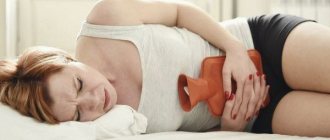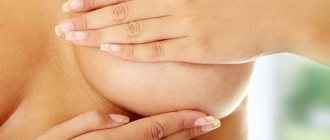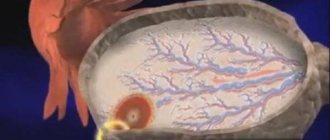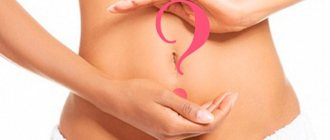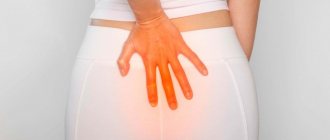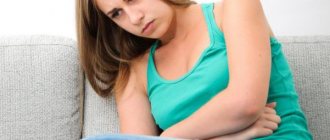The physiological characteristics of the female body have a huge connection with the course of the menstrual cycle. Any pathological changes in the body, as well as the negative influence of the external environment, can provoke amenorrhea, that is, cyclical disturbances of the natural process. This is associated with the appearance in women of a large number of unpleasant, painful and tickling sensations that significantly impair the quality of life.
Itching that appears regularly after menstruation can be caused both by everyday conditions, which any woman can get rid of independently, and by the development of serious diseases. In the latter case, only a qualified doctor can help.
Natural process: ovulation
Why does my stomach hurt after my period? The cause of this symptom may be natural or pathological. The first type is ovulation. For some representatives of the fairer sex, it can occur as early as the 7th day after the start of a new cycle. This often happens with a short female period, lasting less than 21-25 days.
During ovulation, the follicle ruptures, which causes tension and nagging pain. The unpleasant sensations are not too intense, they can be tolerated. The pain goes away within a few hours. If the malaise persists for more than a day, then the main reasons lie elsewhere. Most likely, in your case we are talking about pathology.
Dangerous combinations
The nagging pain itself does not cause any particular problems for a woman. However, there are a number of symptoms, in combination with which discomfort signals dangerous conditions:
- breast tenderness, increase in size, appearance of purulent discharge;
- too long and heavy periods;
- menstrual irregularities;
- discharge of an unusual color and a repulsive odor;
- high body temperature (from 38 degrees);
- acute painful sensations;
- increasing pain;
- heavy bleeding.
Nagging pain a week after menstruation is a reason to think about pathologies that have arisen in the body. You shouldn’t guess and wait for improvements with folded hands. Seeing a doctor will help determine the nature of the disease and prescribe appropriate treatment. In this case, inflamed appendicitis, urolithiasis, or even oncology may be hidden under the guise of a gynecological illness.
Inflammation of the genital organs
Many women throughout their lives are faced with such diagnoses as “endometritis”, “metritis”, “salpingitis”, “adnexitis”, “cervicitis”, “vaginitis” and so on. They all talk about a pathological process in the reproductive organs - inflammation. The main symptom is the following: the stomach hurts after menstruation, as before menstruation. A woman experiences a pulling, bursting sensation, and sexual intercourse often brings discomfort. No wonder: the organs became inflamed and increased in size.
Only a specialist can determine the nature of the pathology. To do this, a woman needs to undergo some tests. Most often the problem is caused by bacteria. In this case, a course of antibiotics is prescribed. If the cause lies in a viral infection, then immunomodulators are used. Drugs that are prescribed to women in these cases: Vilprafen, Azithromycin, Suprax, Isoprinosine, Terzhinan, Klion D and many others. Do not take them yourself!
Main provoking factors
Many representatives of the fair sex are familiar with the unbearable desire to comb the intimate area, which occurs with enviable regularity every month. For some, it appears immediately after menstrual flow begins, which is easily explained by poor hygiene, and for some women itching of the vaginal area is characteristic, associated with their end.
This situation can be caused by both nutritional, household and hygienic violations, and the development of serious pathologies in a woman’s body.
Comprehensive information about why vulvar itching appears during this period is provided by gynecologists who directly deal with female intimate problems. The main factors provoking the attack, due to which the pathological phenomenon begins, in their opinion, include the following:
- insufficiency or excess of hygiene measures carried out in the intimate area;
- allergic reaction to panty liners, soap, shower gel;
- the use of certain medications, the use of which involves the appearance of itching as a side effect;
- excess or significant underweight;
- improper use of products intended for depilation procedures;
- decreased immunity.
Specific everyday causes can also affect the development of a pathological phenomenon in the intimate area. Itching in the intimate area will definitely begin due to the fact that the woman regularly visits the pool and does not attach much importance to thoroughly washing off the chlorine that has settled on the body.
A disturbance in the microflora in the vagina can also cause burning and itching associated with menstruation to appear in the vagina. Both frequent douching and uncontrolled use of certain medications, in particular antibiotics, can provoke this negative phenomenon.
Experts do not exclude such a reason that causes the appearance of tickling-painful sensations in the intimate area after the end of the menstrual period, such as a woman’s regular wearing of panties made of satin or synthetic fabric.
In addition, the desire to constantly scratch the intimate area may occur immediately after sexual intercourse. In this case, experts consider this negative phenomenon as an allergy to sperm or latex products.
Neoplasms and benign tumors
Often a woman is faced with the fact that her stomach hurts after menstruation, as well as before and during menstruation. This sign may indicate neoplasms. Often, fibroids cause discomfort. Moreover, its size must already be serious if pain occurs. The lower abdomen may feel tight due to polyps or cysts on the ovaries. All these pathologies are detected during standard gynecological examinations. Endometriosis can also cause pain. This disease is more difficult to detect and confirm.
Treatment in these cases is chosen individually. For example, endometrial polyps require gynecological curettage. If we are talking about fibroids, then they use the newest method: blocking the uterine artery. Cysts are treated with medication or surgery (depending on the type of tumor). Endometriosis often requires surgical intervention. All of these pathologies require hormonal correction.
Treatment
The treatment method used to eliminate itching will depend on the diagnosis given to the patient after all examinations:
- for colpitis, the use of anti-inflammatory drugs is prescribed with mandatory douching with disinfectant solutions such as chlorhexidine. Hormonal and antibacterial therapy may include drugs such as Ofor, Terzhinan or Metronidazole;
- thrush is treated with antifungal drugs, which in the vast majority are designed to boost a woman’s immunity. To eliminate burning and itching, local medications are used in the form of ointments, creams and suppositories;
- Trichomoniasis is treated with Metronidazole, and local therapy is considered useless by specialists. For this pathology, only oral medications are used;
- herpes is treated with antiviral drugs;
- for adnexitis or endometritis, it is necessary to use complex therapy, including not only analgesics, antibiotics and vitamins, but also physiotherapeutic measures.
Only a specialist can prescribe adequate treatment for any of the pathologies listed above. Self-treatment can worsen the patient’s health or remove only the symptoms of the disease, leaving the root cause, which will certainly lead to a relapse of the disease in the future.
When undergoing a treatment course, you need to maintain sexual rest, adhere to a dietary diet, if the vagina is excessively dry, use natural lubricants and regularly perform hygiene procedures.
Oncological disease
Why does a woman's lower abdomen hurt after her period? The cause of the malaise can be quite serious: a malignant tumor. It is diagnosed in approximately one woman out of ten (with complaints of abdominal pain). The tumor can be located anywhere: the uterus, fallopian tubes, vagina, intestines, abdominal cavity, and so on. Studies such as computed tomography or MRI will help to reliably establish its presence. Sometimes an ultrasound is also indicative.
The treatment is expected to be as follows. To begin with, the tumor must be removed using surgical methods. After this, the woman is prescribed chemotherapy and radiation. Further corrective scheme is selected individually in accordance with the results of histological examination.
Types of diseases that cause pain
Prolonged pain in the lower abdomen, lasting more than 2 days after the cessation of menstruation, can be a symptom of a number of serious diseases and pathological processes occurring in the female body.
| Sign | Classification | Diseases |
| By nature of manifestation | Infectious | Cystitis, endometritis, cervicitis, adnexitis, chlamydia, colpitis, thrush, salpingoophoritis, vulvitis, hepatitis C, syphilis, typhoid fever, salmonellosis, genital tuberculosis. |
| Non-infectious | Uterine fibroids, ovarian cyst, polycystic ovary syndrome, endometriosis, gastritis, urolithiasis, mastopathy, malignant tumors. | |
| By area of origin | Diseases of the genitourinary system | Cystitis, urethritis, urolithiasis, pyelonephritis, uterine fibroids, thrush, vaginitis, cervical erosion. |
| Gastrointestinal diseases | Peptic ulcer, gastritis, cholecystitis, colitis, peritonitis, duodenitis, appendicitis, liver cirrhosis, pancreatitis. | |
| Diseases of the musculoskeletal system | Spinal hernias, osteochondrosis, osteoporosis. | |
| Endocrine system diseases | Hyperthyroidism, hypothyroidism, hypothalamic syndrome, prolactinoma, hypogonadism, obesity. | |
| By duration | Acute | Acute pyelonephritis, cystitis, enteritis, vulvitis, colitis. |
| Subacute | Pyelonephritis, colitis, enteritis, thyroiditis, vaginitis. | |
| Chronic | Chronic gastritis, cholecystitis, cystitis, pancreatitis, glomerulonephritis, colitis. |
Pregnancy and the threat of miscarriage
Why does my stomach and lower back hurt after my period? The reason may be hidden in the new situation of the fairer sex - pregnancy. If menstruation began earlier or, on the contrary, came late, and you also noticed the scarcity of discharge, then such an outcome is not excluded.
During pregnancy (especially in its early stages), detachment of the fertilized egg may occur. The resulting hematoma subsequently resolves or drains through the vagina. The second case suggests the presence of bleeding. Discharge also appears during implantation of the fertilized egg. If you notice unusual menstruation, after which pulling sensations in the abdomen and lower back persist, then get checked for pregnancy.
Malfunctions of the digestive system
If the lower abdomen hurts after menstruation, the reason does not always lie in gynecology. You may have problems with your gastrointestinal tract. Think about the last time you had a bowel movement. If you have constipation, you need to take laxatives. The safest are Duphalac, Guttalax, Microlax. For diarrhea, on the contrary, it is worth using medications that strengthen the intestines: Imodium, Loperamide. Be sure to review your diet. If other symptoms (high fever, nausea, vomiting) are added to the abdominal pain, then we may be talking about appendicitis or an acute intestinal infection. In such situations, only a doctor can find out the main causes of the ailment. Contact your doctor for an individual prescription.
What to pay attention to
Such fluctuations are sometimes associated with stress, taking specific medications, weakening of the body, changes in diet, and other factors. Hormonal fluctuations lead to contraction of the uterus after the end of menstruation, which entails noticeable discomfort.
But if the pain lasts more than a couple of days, is of high intensity, or there are other symptoms (nausea, fever, vomiting, weakness, dizziness), you should consult a doctor. If the clinical picture is pronounced, sometimes an ambulance is required.
Stomach ache after menstruation (as before menstruation): treatment
How can you correct your poor health? If we are talking about symptomatic treatment, then any painkillers or antispasmodics will do: “No-Shpa”, “Papazol”, “Ibuprofen”, “Analgin” and so on. But they must be taken very carefully. Many drugs are contraindicated in pregnant women. You should not use painkillers if you are not sure of the cause of the ailment, because such drugs can blur the clinical picture of the disease.
If your lower abdomen hurts after menstruation, refrain from physical activity and get plenty of rest. Eat healthy food, avoid alcohol and fatty foods. You can use a homemade heating pad by placing it on your lower abdomen. If the house is cold, you should definitely wear warm socks. Brew soothing and anti-inflammatory herbs for yourself: chamomile, sage, calendula. Be sure to see a doctor if you have stomach pain after your period (like before your period) and discharge with an unpleasant odor.
Prevention
Preventive measures for pain after menstruation are aimed at alleviating unpleasant sensations and eliminating possible causes of their manifestation:
- strengthening the immune system;
- avoiding hypothermia;
- proper nutrition (including unsaturated fatty acids, magnesium and calcium);
- genital hygiene;
- giving up bad habits (strong coffee, tea, alcohol, cigarettes);
- refusal of abortion and promiscuity;
- timely replacement of the IUD;
- refusal to use hormone-containing drugs without consulting a specialist;
- timely examination by a gynecologist;
- avoidance of strong physical exertion and emotional stress;
- use of strengthening and anti-inflammatory folk remedies;
- yoga classes.
Summarize
From the article you were able to learn the main reasons why your stomach may hurt after menstruation, as before it. We are not always talking about pathology. If the previous cycle was without ovulation, then the formation of functional cysts is possible. They cause discomfort when large, but do not pose any danger. Within a few weeks the cyst will disappear. But to be sure of your health, you need to see a doctor. Don't guess with coffee grounds why your stomach hurts. Visit a gynecologist and get an individual consultation. Feel good to you!
